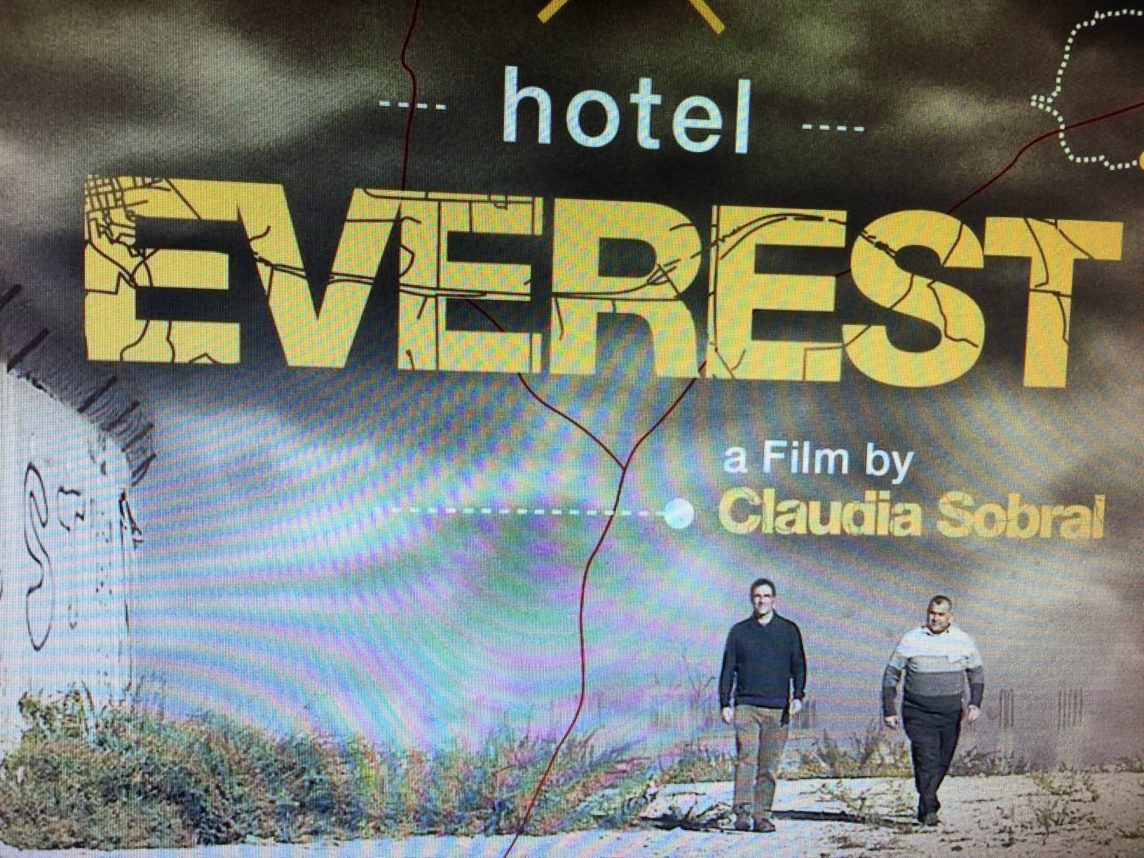

The Trailer for this moving documentary describes the film this way:
“In Israel and Palestine, the road to peace is a steep climb. For three activists, one Israeli, one Palestinian and one American, the challenges seem insurmountable. And yet they try to see and understand the humanity in “the other” and forge connections that promote empathy, understanding and, in their wildest hopes, peace. Hotel Everest is their story.”
This 40-minute film was created by the documentary film-maker Claudia Sobral with her writer Sophie Sartain [full disclosure – both are friends and members of my congregation] and centers around the conversations of three peace activists, retired Israeli Colonel Eden Fuchs, Palestinian Ibrahim Issa, and Buddhist American Whit Jones.
Eden attended the showing of the film at my synagogue and Ibrahim spoke to the assembled via skype from Bethlehem. We were joined in Los Angeles by 80 Israelis, Palestinian Arabs, Middle Eastern Muslims, American Jews, Christians, and others.
The film opens with Whit Jones flying from Boise, Idaho to Tel Aviv. A brief history of the conflict is reviewed that includes footage showing the 1947 UN Partition vote that called for the establishment of a Jewish state and an Arab state in Palestine, and then states that in 1948 the State of Israel became independent, a coordinated attack by all the surrounding Arab nations followed, and hundreds of thousands of Palestinians went into exile many of whom settled in refugee camps.
Colonel Fuchs explained that at the age of 45 he realized that he knew no and had never known any Palestinians personally. It was then that he discovered the Everest Hotel in Beit Jala, an Arab village between Jerusalem and Bethlehem. There, Palestinians and Israelis meet freely, talk and listen to one another, learn of each other’s losses, fears, despair, and dreams, and discover that they share the same fate and must find a way to live together in peace.
When he was 14, Ibrahim was shot by Israeli soldiers in a demonstration. He grew up to understand, however, that violence is not the way to peace. Sitting in Beit Jala alongside Eden, Ibrahim said: “Eden is my brother and I trust him.” Eden responded simply with a full and loving heart: “Thank you!”
In the Q and A I asked Ibrahim how he came to love and trust Eden given their different histories and identities. He said that having a safe space at Hotel Everest opened their hearts to compassion and friendship.
The film did not address the politics of the Israeli-Palestinian conflict, but I couldn’t resist asking what each of them believed to be the best political solution. They agreed that peace can only come when there are mutual respect and acknowledgment of the dignity of the other, when compassion replaces hatred, and Israelis and Palestinians meet as human beings and not as enemies.
Ibrahim said that he believed once in the two states for two peoples resolution of the conflict, but now believes that settlement expansion in the West Bank has foreclosed a two-state solution. A one-state solution, he says, is the way forward, a state in which Palestinians and Israelis share equal rights and acknowledge the dignity and humanity of the “other.”
Eden confessed that he is not a politician and would not express a political position. Rather, he believes that trust, respect, and compassion will result in the right political solution whatever that may be.
Each man has faced dangerous challenges. Eden has been characterized by fellow Israelis as a traitor and as the “seed of Amalek.” He often despairs about this unending conflict, but when he reaches out to his Palestinian partners and they accept his hand with friendship, he knows that “peace can come and my dreams are restored.” He seizes each of the moments as they come.
The film shows Eden arranging for permits with Israeli security services to allow 15 Palestinian Arab women to travel to the Mediterranean Sea to swim in the waters, fully clothed, for the first time in their lives. Though he was gratified to arrange this outing, he felt that his actions forced him to participate in the occupation that he abhors.
Eden worries that the young generation of Israelis who as children were once open-hearted and pure have become hardened as a consequence of serving as occupational soldiers in the West Bank.
Ibrahim too was accused by Palestinian extremists of being a traitor. These extremists regard any Palestinian who cooperates with Israel as contributing to “normalization” of the occupation. Ibrahim rejects the charge explaining that the only way to peace is to engage with and speak to those with whom we disagree.
Hotel Everest is a heart-wrenching and inspiring film that ought to be seen by every Israeli and Palestinian, and especially by their political leadership.
See http://www.fjproductions.com/hoteleverest/ and http://www.hoteleverestthemovie.com/






















 More news and opinions than at a Shabbat dinner, right in your inbox.
More news and opinions than at a Shabbat dinner, right in your inbox.